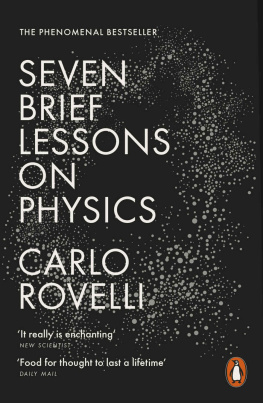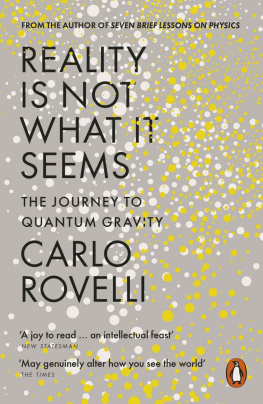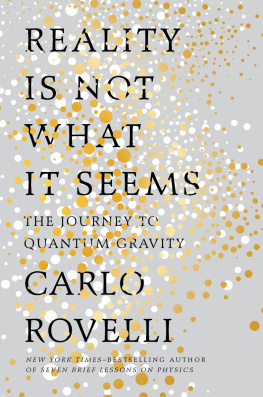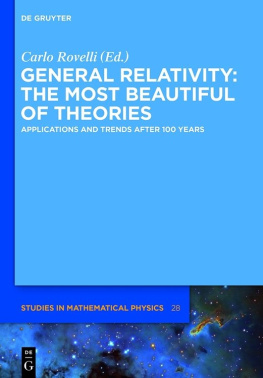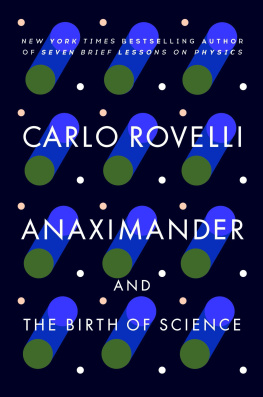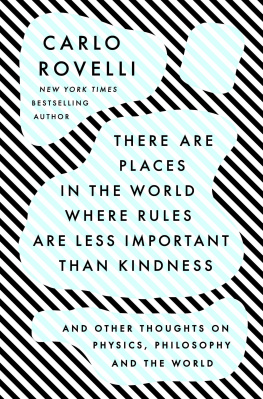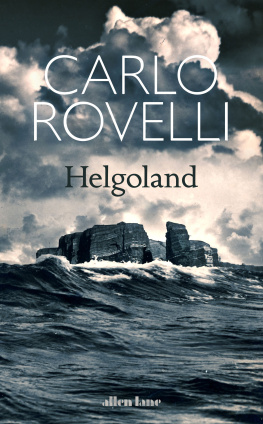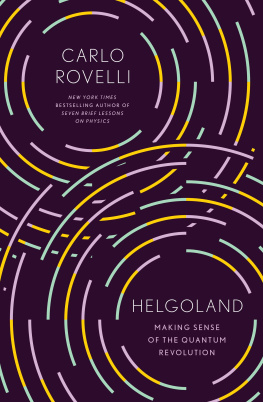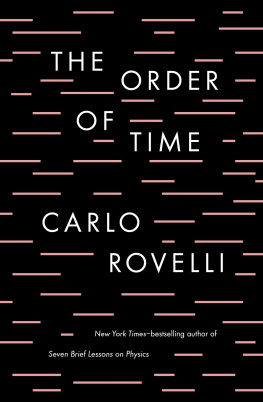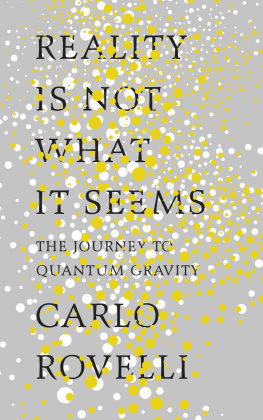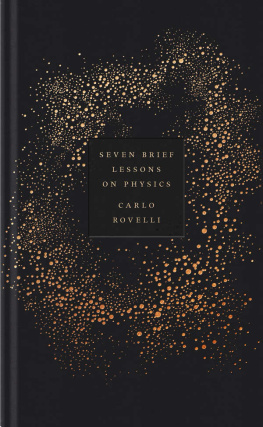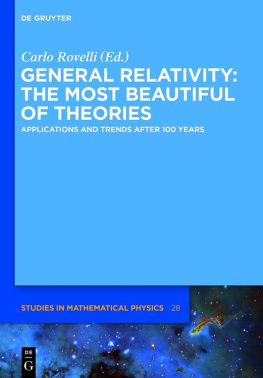Rovelli - Seven Brief Lessons on Physics
Here you can read online Rovelli - Seven Brief Lessons on Physics full text of the book (entire story) in english for free. Download pdf and epub, get meaning, cover and reviews about this ebook. year: 2015, publisher: Penguin Books Ltd, genre: Religion. Description of the work, (preface) as well as reviews are available. Best literature library LitArk.com created for fans of good reading and offers a wide selection of genres:
Romance novel
Science fiction
Adventure
Detective
Science
History
Home and family
Prose
Art
Politics
Computer
Non-fiction
Religion
Business
Children
Humor
Choose a favorite category and find really read worthwhile books. Enjoy immersion in the world of imagination, feel the emotions of the characters or learn something new for yourself, make an fascinating discovery.
Seven Brief Lessons on Physics: summary, description and annotation
We offer to read an annotation, description, summary or preface (depends on what the author of the book "Seven Brief Lessons on Physics" wrote himself). If you haven't found the necessary information about the book — write in the comments, we will try to find it.
Rovelli: author's other books
Who wrote Seven Brief Lessons on Physics? Find out the surname, the name of the author of the book and a list of all author's works by series.
Seven Brief Lessons on Physics — read online for free the complete book (whole text) full work
Below is the text of the book, divided by pages. System saving the place of the last page read, allows you to conveniently read the book "Seven Brief Lessons on Physics" online for free, without having to search again every time where you left off. Put a bookmark, and you can go to the page where you finished reading at any time.
Font size:
Interval:
Bookmark:

Simon Carnell and Erica Segre

FIRST LESSON:
The Most Beautiful of Theories
SECOND LESSON:
Quanta
THIRD LESSON:
The Architecture of the Cosmos
FOURTH LESSON:
Particles
FIFTH LESSON:
Grains of Space
SIXTH LESSON:
Probability, Time and the Heat of Black Holes
IN CLOSING:
Ourselves
Carlo Rovelli is a theoretical physicist who has made significant contributions to the physics of space and time. He has worked in Italy and the US, and is currently directing the quantum gravity research group of the Centre de Physique Thorique in Marseille, France. Seven Brief Lessons on Physics has been translated into thirty-one languages and is an international bestseller.
Rovelli invites his readers to marvel at the splendours of modern physics, to be enchanted by the beauty and the open-ended nature of the quest David Kaiser, Guardian
Bite-sized but big on ideas: Carlo Rovellis SevenBrief Lessons on Physics makes the mysteries of the universe almost comprehensible Katie Law, Evening Standard Books of the Year
Brief but masterful If you want to understand what gets physicists out of bed in the morning, there is no better guide than Rovelli Michael Brooks, New Statesman
Rovelli belongs to a great Italian tradition of one-culture science writing that encompasses the Roman poet Lucretius, Galileo, Primo Levi and Italo Calvino. The physics here is comprehensible and limpid, and Rovelli gives it an edge through his clear-eyed humanistic interpretations Peter Forbes, Independent Books of the Year
There is one significant way in which bestselling theoretical physicist-turned-author Rovelli differs from his predecessors there is a good chance people who start his book will actually finish it Tom Whipple, The Times Books of the Year
Feeling daunted by even attempting to scale Mount Einstein? This Italian bestseller, now translated into English, may be for you. Physicist Carlo Rovelli pulls off the trick of vividly capturing everything from elementary particles to dark matter in 78 pages. Its not just for novices: there are also heady pages on loop quantum gravity New Scientist Books of the Year
A surprise bestseller the most interesting of the years science books Nicholas Blincoe, Daily Telegraph Books of the Year
An understanding of the world requires a basic understanding of physics; something which has just become a little easier thanks to a cult book by an Italian academic Not since Stephen Hawkings (admittedly hard-going) Brief History of Time has there been such a consensual success Ian Thomson Spectator
There have been plenty of attempts in recent years to explain the basic concepts of physics to us, but few as elegant and concise as Carlo Rovellis Nick Rennison Daily Mail
Rovelli moves elegantly between illustrative metaphors, without ever mixing or belabouring any of them The books triumph lies not only in presenting some of the headiest stuff science has produced in so few pages, but also in giving real insight into how science treats those ideas Economist
Brief but eloquent The slim volume is stereotypically the province of poetry, but this beautifully designed little book shows that science, with its curiosity, its intense engagement with what there really is, its readiness to jettison received ways of seeing, is a kind of poetry too Neville Hawcock, Financial Times
Utterly blown away by the concise beauty of Seven Brief Lessons on Physics by Carlo Rovelli. Science as poetry. Awe inspiring Michael Bhaskar, author of The Content Machine
No one should hold office unless they have read Carlo Rovellis Seven Brief Lessons on Physics Nick Harkaway, author of The Gone-Away World and Angelmaker
Delightful The metaphors are vivid, the visions dramatic Nature
These lessons were written for those who know little or nothing about modern science. Together they provide a rapid overview of the most fascinating aspects of the great revolution that has occurred in physics in the twentieth century, and of the questions and mysteries which this revolution has opened up. Because science shows us how to better understand the world, but it also reveals to us just how vast is the extent of what is still not known.
The first lesson is dedicated to Albert Einsteins general theory of relativity, the most beautiful of theories. The second to quantum mechanics, where the most baffling aspects of modern physics lurk. The third is dedicated to the cosmos: the architecture of the universe which we inhabit; the fourth to its elementary particles. The fifth deals with quantum gravity: the attempts which are underway to construct a synthesis of the major discoveries of the twentieth century. The sixth is on probability and the heat of black holes. The final section of the book returns to ourselves, and asks how it is possible to think about our existence in the light of the strange world described by physics.
The lessons are expansions of a series of articles published by the author in the Sunday supplement of the Italian newspaper Il Sole 24 Ore. I would like to thank in particular Armando Massarenti, who can be credited with opening up the cultural pages of a Sunday paper to science, and allowing light to be thrown on the role of this integral and vital aspect of our culture.

In his youth Albert Einstein spent a year loafing aimlessly. You dont get anywhere by not wasting time something, unfortunately, which the parents of teenagers tend frequently to forget. He was in Pavia. He had joined his family having abandoned his studies in Germany, unable to endure the rigours of his high school there. It was the beginning of the twentieth century, and in Italy the beginning of its industrial revolution. His father, an engineer, was installing the first electrical power plants in the Padan plains. Albert was reading Kant and attending occasional lectures at the University of Pavia: for pleasure, without being registered there or having to think about exams. It is thus that serious scientists are made.
After this he registered at the University of Zurich, and immersed himself in the study of physics. A few years later, in 1905, he sent three articles to the most prestigious scientific journal of the period, the Annalen der Physik. Each of these is worthy of a Nobel Prize. The first shows that atoms really exist. The second lays the first foundation for quantum mechanics, which I will discuss in the next lesson. The third presents his first theory of relativity (known today as special relativity), the theory which elucidates how time does not pass identically for everyone: two identical twins find that they are different in age, if one of them has travelled at speed.
Einstein became a renowned scientist overnight and received offers of employment from various universities. But something disturbed him: despite its immediate acclaim, his theory of relativity did not fit with what we know about gravity, namely with how things fall. He came to realize this when writing an article summarizing his theory, and began to wonder if the law of universal gravity as formulated by the father of physics himself, Isaac Newton, was in need of revision in order to make it compatible with the new concept of relativity. He immersed himself in the problem. It would take ten years to resolve. Ten years of frenzied study, attempts, errors, confusion, mistaken articles, brilliant ideas, misconceived ideas.
Font size:
Interval:
Bookmark:
Similar books «Seven Brief Lessons on Physics»
Look at similar books to Seven Brief Lessons on Physics. We have selected literature similar in name and meaning in the hope of providing readers with more options to find new, interesting, not yet read works.
Discussion, reviews of the book Seven Brief Lessons on Physics and just readers' own opinions. Leave your comments, write what you think about the work, its meaning or the main characters. Specify what exactly you liked and what you didn't like, and why you think so.

